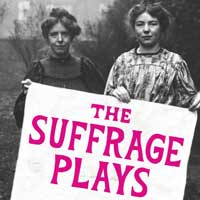
[rating=3] Artemisia Theatre rekindles the longstanding historical tension between mass versus class politics in Great Britain with their production of “The Suffrage Plays”, directed by Beth Wolf. The presentation consists of three distinct one-act comedies about the struggle for women in the United Kingdom to obtain the right to vote during the early 20th century. Two short plays written by Evelyn Glover and called “A Chat with Mrs. Chicky” and “Miss Appleyard’s Awakening” are followed in the second act by George Bernard Shaw’s one-hour “Press Cuttings.” Megan Delay, Lucinda Johnston, and Brittaini Yawn play various roles in all three plays as they depict women of various social stations who demonstrate their support of the suffrage movement—or their opposition to it.
Artemisia Theatre rekindles the longstanding historical tension between mass versus class politics in Great Britain with their production of “The Suffrage Plays”, directed by Beth Wolf. The presentation consists of three distinct one-act comedies about the struggle for women in the United Kingdom to obtain the right to vote during the early 20th century. Two short plays written by Evelyn Glover and called “A Chat with Mrs. Chicky” and “Miss Appleyard’s Awakening” are followed in the second act by George Bernard Shaw’s one-hour “Press Cuttings.” Megan Delay, Lucinda Johnston, and Brittaini Yawn play various roles in all three plays as they depict women of various social stations who demonstrate their support of the suffrage movement—or their opposition to it.
For background, we need to understand that Glover was one of the most influential writers of suffrage plays from 1907 to 1914, writing her original scripts for members of the Actresses Franchise League to be performed by Suffrage Theatre; this was otherwise known as Suffrage Drama. What she was trying to do through the medium of realist theater was to raise the consciousness of likely supporters of the movement.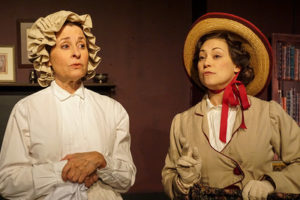
Mrs. Chicky in the first play and Miss Appleyard in the second turn the opposition’s arguments against suffrage into strawmen (pardon the pun). Through the vehicle of asking a fellow woman to sign an anti-suffrage petition, the two plays show that women have their own gendered understanding of what it means to have the vote, whether it is to reinforce the beliefs of their spouses, further their own economic and political interests, or act on their sympathies with the working classes. Glover’s script reveals the various arguments against women receiving the franchise and how these are illogical, if not also nonsensical. This was perfectly understandable to her target audience (watching her original production), as it is to today’s modern audience.
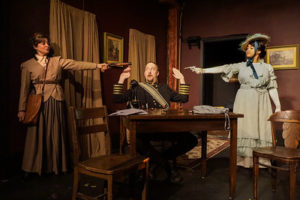 In the first play, Glover uses an elitist upper-class woman (Lucinda Johnston) as a foil, who lectures a charwoman (Megan Delay) who presumes what a woman’s best interest and opinions should be. It is the charwoman, though, who explains the notion of the double standard regarding how women are unfairly treated in the workplace, given lower salaries as compared to men doing the same work, and condemned for not being at home to faithfully care for their husband and children. In the second play, more is made of the fact that some women who are outwardly against the suffrage movement are actually proponents of it. Miss Appleyard (Brittaini Yawn) is initially unwilling to confront her neighbor and tell her upfront that she canvasses for the suffragettes. Only after being seemingly wishy-washy in her discussion of the subject does she reveal her true feelings.
In the first play, Glover uses an elitist upper-class woman (Lucinda Johnston) as a foil, who lectures a charwoman (Megan Delay) who presumes what a woman’s best interest and opinions should be. It is the charwoman, though, who explains the notion of the double standard regarding how women are unfairly treated in the workplace, given lower salaries as compared to men doing the same work, and condemned for not being at home to faithfully care for their husband and children. In the second play, more is made of the fact that some women who are outwardly against the suffrage movement are actually proponents of it. Miss Appleyard (Brittaini Yawn) is initially unwilling to confront her neighbor and tell her upfront that she canvasses for the suffragettes. Only after being seemingly wishy-washy in her discussion of the subject does she reveal her true feelings.
Then came intermission, and the comment I made to my guest was that “It’s all very cerebral.” Her response was that “Women do have brains after all.”
The third play was totally different in tone, atmosphere, and style from the other two. Here we are introduced to three male characters, who largely contend that the suffragettes’ demands are patently absurd and that their arguments are untenable. Unlike the two previous plays, where the backdrop is inside a house, the action here takes place in a government office; a multifunctional set design by Jillian Gryziak serves well. Now the audience witnesses the largely negative reaction on the part of governmental and military officials to the women’s movement taking place outdoors, where the story is told via accounts of what is happening (off stage) on the streets where suffragettes are marching. The funniest bit is when the prime minister Baisquith (Tom McGrath) has to come into the military general’s office dressed as a woman so as not to be attacked by those disliking him and his anti-suffrage politics. Also notable is the combined desperation, enthusiasm, and squirreliness of the orderly (Vijay Sarathi). That said, the best part of the second act is Ross Frawley’s fabulous portrayal of General Michener. What a commanding performance! He brilliantly exposes Shaw’s dark humor about shooting women marchers and women in general. After all, in the society of his day, neither he nor any other male could have possibly been serious about violence against women—at least outwardly—for such a thing was absolutely out of the question.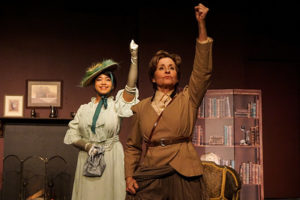
Note that the personalities whom Shaw depicted are thinly veiled caricatures of real persons of his day. Mitchener is reminiscent of General Kitchener possibly combined with First Viscount Alfred Milner. Baisquith is a combination of Arthur Bailfour, prime minister from 1902 to 1905 and H. H. Asquith, who became prime minister in 1908 and was in power when this farce was written in 1909.
Unfortunately, a modern audience doesn’t know who these people are. Plus Shaw’s farce has little of the headiness that shrouded Glover’s plays. He preferred to advocate for his pro-suffrage beliefs by displaying the ridiculousness of the men and women in opposition. While Glover made fun of the anti-suffragists via argument and irony, Shaw did so via buffoonery, that is, by attacking the person rather than the idea. Consequently, the third play is more of a comedy of manners rather than a comedy of the intellect. It’s the difference between attacking the argument versus the person. As “Press Cuttings” descends into the nonsensical and as people are made out to look stupid, the story devolves into having less to do with suffrage or the vote and more to do with taking an easy jab at a political opponent. Trying to tie up loose ends like a Shakespearean comedy might have worked a hundred years ago, but it doesn’t work well for audiences today. Shaw is well known for his brilliant wit in classics such as “Man and Superman”, “Pygmalion”, “Major Barbara”, and the like, but this script, in my view, is not worthy of replication, even as a historical piece. As a story dealing with suffrage, it’s too frivolous; as a comedy, it is too mired in Shaw’s politics of the day. This is akin to watching a comic on stage or on TV make fun of a modern politician; this will not be nearly as funny twenty, thirty, or a hundred years from now when a lot of the current references are lost.
There is a saying that “history is written by the victors.” Since the victors in this movement are the women who got the right to vote, reading about this chapter in history might make it seem as if this struggle came so easy in a democratic society. That is far from the truth. Women (and some men) had to work hard for their successes: They had to march; they had to picket; they had to stir up the consciousness of many people—men and women of different social classes and backgrounds—through leaflets, meetings, and assemblies, so forth and so on. Please reflect upon the fact that the Equal Rights Amendment (for women) has never been passed in the United States and that some of the same arguments that were used in the anti-suffrage movement have been the exact same ones being espoused through the present day.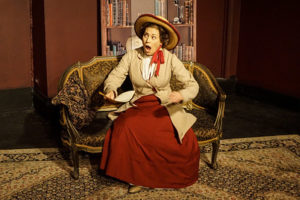
Artemisia Theatre is focusing on women’s suffrage to celebrate the upcoming 100th anniversary of the ratification of the 19th Amendment in the United States in 2020, and “to bring to light the importance of one person – one vote in anticipation of the 2020 presidential election.”
One of the last remnants of the U.S. suffragist movement is the League of Women Voters, a non-partisan civic organization founded in 1920 by Carrie Chapman Catt. Its purpose was “to help women take a larger role in public affairs after they won the right to vote. After watching “The Suffrage Plays”, I felt I had gained a clear political focus of that era in Britain a century ago, something often lacking in today’s political discourse, where the nation’s problems are supposed to be solved in 30-second sound bytes. Maybe it’s time for the League of Women Voters to chair the Presidential debates again on behalf of the public interest. Perhaps this will help to get people in our divided nation to start thinking thoroughly and thoughtfully about meaningful solutions rather than spending time lambasting each other with zingers.
Performances of “The Suffrage Plays” take place in theatre 3A at The Den Theatre, 1331 N. Milwaukee Avenue, Chicago, through November 24, 2019, according to the following schedule:
Wednesday through Saturday – 7:30 p.m. (Note that Wednesday, November 20th is sold out.)
Sunday – 3:00 p.m.
Tickets are: $30 general admission
Tickets may be purchased through the box office 773-697-3830 or on-line at http://artemisiatheatre.org/plays/
For more information or to subscribe to Artemisia’s newsletter, go to http://artemisiatheatre.org
Public transportation; CTA Blue Line to Division; Bus: 9, 50, 56. Metered parking is available on Milwaukee Avenue and on surrounding side streets. Pay Boxes are enforced from 8:00 AM to 10:00 PM on Milwaukee Avenue and from 8:00 AM to 6:00 PM on Side Streets. Parking is also available through Spot Hero.
To see what others are saying, visit www.theatreinchicago.com, go to Review Round-Up and click at “The Suffrage Plays”.






More Stories
“Prayer for the French Republic” reviewed by Julia W. Rath ( and another by Paul Lisnek)
“Obliteration” reviewed by Mark Reinecke
” A Jukebox for the Algonquin”